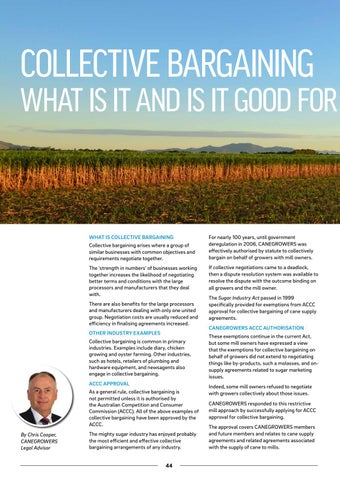COLLECTIVE BARGAINING
WHAT IS IT AND IS IT GOOD FOR
WHAT IS COLLECTIVE BARGAINING Collective bargaining arises where a group of similar businesses with common objectives and requirements negotiate together. The ‘strength in numbers’ of businesses working together increases the likelihood of negotiating better terms and conditions with the large processors and manufacturers that they deal with. There are also benefits for the large processors and manufacturers dealing with only one united group. Negotiation costs are usually reduced and efficiency in finalising agreements increased. OTHER INDUSTRY EXAMPLES Collective bargaining is common in primary industries. Examples include diary, chicken growing and oyster farming. Other industries, such as hotels, retailers of plumbing and hardware equipment, and newsagents also engage in collective bargaining. ACCC APPROVAL As a general rule, collective bargaining is not permitted unless it is authorised by the Australian Competition and Consumer Commission (ACCC). All of the above examples of collective bargaining have been approved by the ACCC. By Chris Cooper, CANEGROWERS Legal Advisor
The mighty sugar industry has enjoyed probably the most efficient and effective collective bargaining arrangements of any industry.
44
For nearly 100 years, until government deregulation in 2006, CANEGROWERS was effectively authorised by statute to collectively bargain on behalf of growers with mill owners. If collective negotiations came to a deadlock, then a dispute resolution system was available to resolve the dispute with the outcome binding on all growers and the mill owner. The Sugar Industry Act passed in 1999 specifically provided for exemptions from ACCC approval for collective bargaining of cane supply agreements. CANEGROWERS ACCC AUTHORISATION These exemptions continue in the current Act, but some mill owners have expressed a view that the exemptions for collective bargaining on behalf of growers did not extend to negotiating things like by-products, such a molasses, and onsupply agreements related to sugar marketing issues. Indeed, some mill owners refused to negotiate with growers collectively about those issues. CANEGROWERS responded to this restrictive mill approach by successfully applying for ACCC approval for collective bargaining. The approval covers CANEGROWERS members and future members and relates to cane supply agreements and related agreements associated with the supply of cane to mills.








